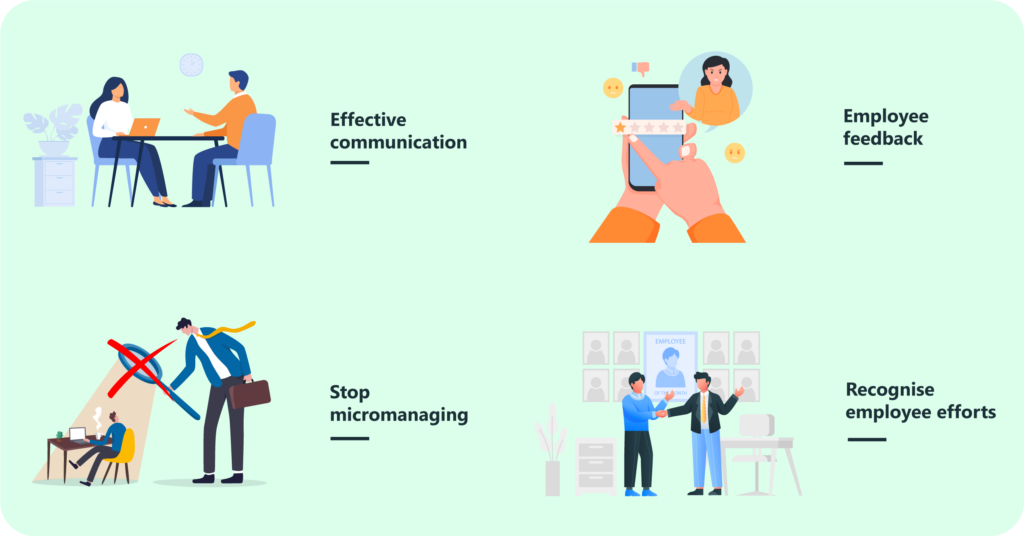Work can be rewarding, but how we work matters. Giving employees autonomy can make them feel good and engaged, but it’s not always simple. Employers need to provide the right support while giving them space to thrive. How do we find this balance? This article explores the pros and cons of employee autonomy, and how to use it effectively for a happy and productive team. Let’s dive into the benefits first.
What is Autonomy at Workplace
At work, true autonomy isn’t just flexible hours or where you work. It’s about you feeling empowered! It means having control over how you tackle tasks, set your own deadlines, and sometimes even what you work on.
Imagine you need to work from home on a Friday, not the pre-set ‘work-from-home’ days. True autonomy lets you choose what works best for you, not a fixed schedule. This freedom gives you a sense of ownership and accomplishment, making work more satisfying and less draining.
Benefits of Autonomy at Workplace
We are living in an age where the way we work has changed significantly. Employers give ownership to their staff empowering them to take the lead and infuse their creativity to offer the best results. Employees are allowed to make their decisions independently without any supervision. This helps unleash their inner creativity to take the necessary actions.
Here are some benefits employers should know about offering autonomy at the workplace.
Employee Engagement
Studies show flexible schedules and work locations, key parts of autonomy, lead to happier, more invested employees. They’re more likely to feel ‘present’ and motivated, ultimately benefiting both them and the company.
Increased Satisfaction
Autonomy fuels happy workers! Research reveals that employees who make their own work calls experience greater job satisfaction and well-being. Feeling empowered instead of micromanaged makes work more enjoyable, leading to a win-win for employees and companies.
Unleash Creativity
Imagine being told ‘paint a masterpiece’, but not how to do it. That’s what micromanagement feels like. Autonomy allows diverse minds to explore different solutions, leading to better results. A study linked autonomy to increased innovation, helping businesses stay ahead of the curve.
Build Ownership and Accountability
Nobody likes feeling like a cog in a machine. Autonomy allows employees to own their work, leading to a greater sense of responsibility and accountability. When they have a stake in the outcome, they’re more likely to go the extra mile, boosting productivity and engagement for everyone.
Improve Work-Life Balance
Autonomy to the rescue! A recent study showed employees who choose their work hours and location report higher happiness and better work-life balance. Freedom fuels well-being, making everyone happier and more productive.

Best Ways Employers Can Instill Autonomy at the Workplace
Workplace autonomy, giving employees control over their tasks and schedules, is a rising star in boosting engagement and productivity. But how do employers navigate this shift effectively? Here are some winning strategies:
Set Guidelines and Goals
While granting freedom empowers employees and boosts results, clear guardrails are crucial. Set core working hours for easy connection, establish clear goals and hold everyone accountable, and introduce autonomy gradually to observe and adapt.
Remember, open communication and trust are key to building a thriving, autonomous work environment where everyone wins.
Embrace Flexible Schedules and Locations
Ditch the rigid 9-to-5! Offer flexible working hours and remote work options. Studies show this empowers employees, improves work-life balance, and even attracts top talent. Remember, clear expectations are key – define core working hours, communication channels, and appropriate remote work locations.
Encourage Skill Development
Invest in your employees’ growth. Offer training, workshops, and resources to help them develop new skills and expand their knowledge. This empowers them to take on more challenging tasks and contribute even more to the team.
Empower Decision-Making
Trust your team! Give employees a say in how they tackle tasks and projects. Provide clear goals and objectives, then let them brainstorm and choose their approach. This fosters ownership, creativity, and a sense of responsibility, leading to better results.
Recognize and Provide Regular Feedback
Feedback shouldn’t be a one-time event. Offer regular constructive feedback and recognize achievements publicly. This helps employees understand their strengths and areas for improvement, motivating them to strive for excellence.
Give Freedom to Choose Projects
Let employees select projects that spark their interest and expertise. Give team members the freedom to self-assign or negotiate tasks based on their skills and workload. It’s a win-win: happier, motivated employees and projects tackled by the right people.
Offer Time Flexibility
Ditch the clock, embrace control! Give your team the freedom to set their own hours, as long as they deliver quality work on time. This flexibility fuels well-being, reduces stress, and boosts productivity. Trust reigns, responsibility thrives, and everyone wins.
Provide Psychological Safety
Fearless innovation takes flight! Create a work environment where “mistakes” spark learning, not judgment. This “psychological safety” lets employees try new things, ask for help, and bounce back from setbacks. See failure as fuel for growth, not a reason for blame. Together, learn, adapt, and soar.
Unlock the Power Within
Unlocking the power within! While the road to workplace autonomy demands dedication, the rewards are vast. Build trust, offer flexibility, invest in growth, recognize achievements, and lead by empowering examples. Gather feedback, adapt, and together, watch your team blossom into a high-performance force fueled by ownership and innovation. Embrace the journey, empower your people, and watch your organization soar higher than ever before.

















